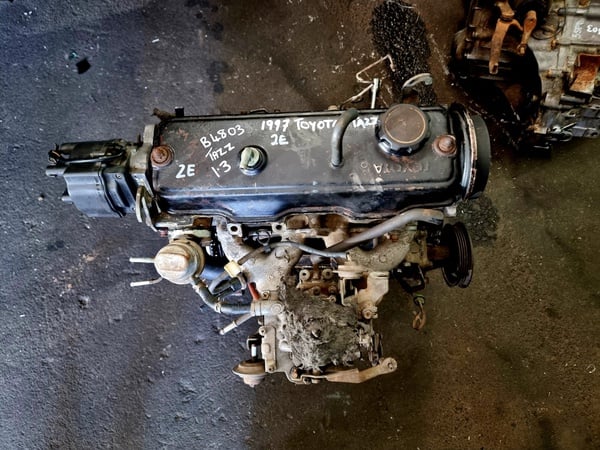Engine Purchasing Professional Tips on Choosing the Right Engine for Your Specific Demands
Picking the ideal engine for your particular needs includes an intricate interaction of elements that go past simple horsepower numbers. By diving into the intricacies of power versus efficiency, assessing gas rankings, and budgeting for lasting expenses, one can truly optimize their engine selection.
Power Vs. Performance: Discovering the Balance

When choosing an engine, it is vital to strike an equilibrium between power and efficiency to fulfill your certain needs successfully. Power describes the engine's capability to create power for propulsion, identifying variables like velocity, lugging capability, and total performance (Toyota Tazz Engine For Sale). On the other hand, efficiency relates to just how well the engine makes use of gas to generate power, impacting aspects such as fuel economy and ecological friendliness
Achieving the appropriate balance in between power and effectiveness is vital because an engine that is also powerful might take in excessive gas, leading to greater operating costs and unneeded strain on the setting. On the other hand, an engine that prioritizes effectiveness over power may cause sluggish efficiency, especially in requiring situations like lugging hefty loads or driving uphill.
To make a notified decision, think about factors such as your normal driving conditions, the designated use of the vehicle, and your individual preferences. By examining your requirements and top priorities, you can choose an engine that strikes the perfect equilibrium in between power and performance, guaranteeing ideal efficiency while minimizing environmental effect and operating expense.
Recognizing Engine Size and Kind

Typical engine types include inline engines, V engines, and rotating engines, each with its one-of-a-kind benefits and disadvantages. Comprehending the interplay in between engine size and type is crucial in choosing an engine that aligns with your specific demands and top priorities, whether it be power, performance, or an equilibrium of both.
Consider Your Car's Requirements
Considering your vehicle's needs is a basic action in the engine selection procedure to ensure optimum performance and capability. It is important to evaluate aspects such as the intended use the vehicle, its weight, lugging capability, and fuel effectiveness needs. As an example, if you are searching for an engine for a sturdy vehicle that will be made use of for towing, you will certainly need an effective engine with high torque capacities. On the other hand, if you are picking an engine for a small cars and truck primarily made use of for city commuting, fuel performance might be a more important factor to take into consideration.

Evaluating Gas Effectiveness Rankings
Evaluating gas performance rankings is a critical facet of picking the ideal engine for your car, making sure price financial savings and environmental sustainability. Fuel efficiency rankings, generally measured in miles per gallon (MPG) for fuel engines or kilowatt-hours per 100 miles (kWh/100 miles) for electrical engines, suggest how much a lorry can take a trip on a certain amount of fuel or electricity. Greater MPG or lower kWh/100 miles values indicate extra effective engines, equating to decreased gas expenses and lower carbon exhausts.
When assessing fuel performance scores, consider your driving practices and demands. If you commute cross countries daily, a very fuel-efficient engine can lead to significant financial savings in time. Additionally, contrast different engine alternatives within the visit this site exact same lorry class to recognize the most affordable option. Factors such as engine dimension, weight, aerodynamics, and hybrid or electrical capabilities can all affect gas efficiency.
Budgeting for Long-Term Prices
Purposefully intending for long-term expenses is imperative when picking an engine, ensuring monetary sustainability over the lorry's lifespan. While the initial purchase price of an engine is a substantial element, it is critical to consider the long-term expenses connected with maintenance, repair services, and fuel usage.
Moreover, looking into the schedule and expense of substitute parts for the picked engine is important in spending plan planning. Engines with inexpensive and easily available parts can substantially influence long-lasting upkeep expenses. Additionally, considering the engine's toughness and anticipated lifespan can help avoid unanticipated substitute expenses in the future. By very carefully budgeting for these lasting costs and factoring them into the decision-making procedure, individuals can pick an engine that not just satisfies their instant demands but additionally stays economical throughout its life expectancy.
Conclusion
In verdict, selecting the appropriate engine for your specific needs needs balancing power and effectiveness, recognizing engine size and kind, considering your car's demands, evaluating fuel performance scores, and budgeting for long-term prices. By meticulously taking into consideration these aspects, you can ensure that you choose an engine that meets your requirements and gives ideal efficiency for your lorry.
To better refine the selection process of an engine that strikes the ideal balance in between power and effectiveness, it is crucial to dig right into the ins and outs of recognizing engine size and type. Engine size refers to the complete volume of air and fuel that can be pushed with the engine cylinders. Typical engine kinds include inline engines, V engines, and rotating engines, each with its distinct advantages and downsides. Understanding the interplay in between engine dimension and kind is vital in picking an engine that lines up with your details requirements and priorities, whether it be power, effectiveness, or an equilibrium of both.
Gas effectiveness ratings, generally measured in miles per gallon (MPG) for gas engines or kilowatt-hours per 100 miles (kWh/100 miles) for electrical engines, suggest just how far a vehicle hop over to here can take a trip on a details quantity of fuel or power.